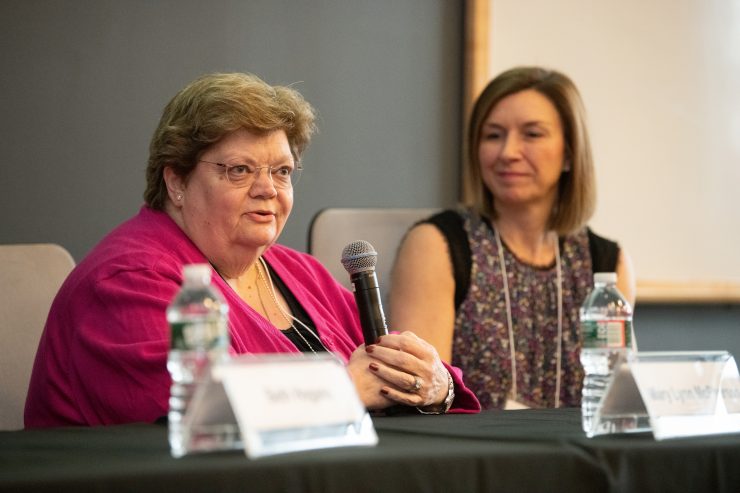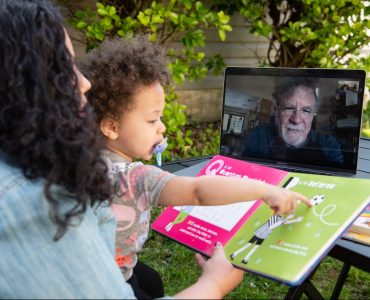The University of Maryland School of Pharmacy (UMSOP) has been a national leader in palliative care education since 2017, when it launched its innovative, popular, and online Graduate Certificate and Master of Science in Palliative Care programs. The next logical step in this educational evolution? A PhD.
“Our palliative care programs were a hit right out of the gate. The Master of Science program is amazing, and many students didn’t want the journey to stop,” said executive program director Mary Lynn McPherson, PharmD, MA, MDE, BCPS. “There are only three or four PhD programs in palliative care in the world, and I strongly felt it was time to have one in the United States. I believe this program meets a pressing need in the palliative care field.”
The three programs teach primary, secondary, and tertiary skills, respectively, in palliative care, which addresses the physical, psychological, social, and spiritual needs of patients living with a serious or advanced illness and their families. The PhD program, which launched in August 2021, is for tertiary care providers who are in academia, do research, or work for foundations or large academic medical centers.
“There is a growing number of people suffering from chronic, progressive, and ultimately fatal disease,” said McPherson, who’s also a professor and director of Advanced Post-Graduate Education in Palliative Care in the Department of Pharmacy Practice and Science at UMSOP. “Their need for excellent palliative care is imperative. To educate and empower a growing palliative care workforce, individuals with the skills to provide excellent instructional design, comprehensive curricula, and vibrant research are critically needed. This PhD program is the first in the U.S. to establish those individuals. It’s a really big deal.”
McPherson designed the new program after consulting with leaders in the field including Constance M. Dahlin, MSN, ANP-BC, ACHPN, FPSN, FAAN, a nurse practitioner and palliative care specialist from the Boston area. McPherson and Dahlin also gained more information by interviewing experts in the field for a series titled “Founders, Leaders and Futurists in Palliative Care” as part of McPherson’s “Palliative Care Chat” podcast.
“I thought we knew our stuff, but it was enlightening to hear from people who literally were boots on the ground in the 1950s, ’60s, ’70s, and into the late ’70s, when hospice came to this country,” McPherson said. “They had tremendous insight and provided advice for the practitioners of today and more importantly for the students in this program.”
Diverse and ‘Inspiring’ Cohort
The average student will take three to four years to complete the PhD in Palliative Care, which requires 36 credits via eight 3-credit courses and a 12-credit dissertation. The first cohort is a diverse group of 10 composed of four physicians, two advanced practice nurses, and one social worker, chaplain, nurse, and physician’s assistant. Dahlin called the group “passionate, motivated, and inspiring.”
“It has been a joy to watch them synthesize and grow their understanding of the environmental, social, and political context of palliative care,” said Dahlin, who is teaching the program’s first course, Understanding the Foundation of Palliative Care: Building Blocks for the Future. “They are creating road maps for the maturity of the field, because they are the future leaders of palliative care.”
One student, Arlen Gaines, MSW, LCSW-C, ACHP-SW, is a clinical manager for JSSA Hospice in Montgomery County, Md., and co-author of a book series titled “I Have a Question,” which is designed for special needs children and covers topics such as death, cancer, and divorce. A graduate of the University of Maryland School of Social Work, Gaines said she had long wanted to earn a doctorate and found the PhD program “too good to be true.”
“I have a strong interest in making sure we are supporting all families — inclusive of children and adults with special needs — around the topics of grief, loss, and difficult life transitions,” Gaines said. “I hope to use this PhD to contribute to the field in innovative ways. I look forward to learning best practices in research and thinking critically and outside the box.
“The program provides a rich, vibrant hub of learning,” she added. “We have our own interdisciplinary team, and it truly represents the spirit of collaboration that I love so much about hospice and palliative care.”
Another student, Andy Arwari, MD, FACP, SFHM, FAAHPM, HMDC, ACC, a medical director for VITAS Health Care, a hospice provider in Miami, Fla., said he had a mix of excitement and trepidation in joining the first cohort, but the jitters were short-lived.
“I have the opportunity to further explore our field and gain a deeper understanding of its nuances and complexities,” he said. “My trepidation disappeared when I met the cohort and professors. The excitement become enthusiasm as I realized I was among kindred spirits who are eager to learn, teach, and advocate for taking hospice and palliative care to the next level.”
‘Keep the Ball in Play’
McPherson said she is thrilled with the professional diversity of the group, saying it came together to form “a very tight cohort” in short order despite the online learning environment.
“If you’ve never taught or taken an online course, it’s hard to imagine the experience,” she said. “The students are engaged to a great degree in the program and with one another. The faculty serve more as the ‘guide on the side’ instead of the ‘sage on the stage’ — they gently push the students to develop a deeper understanding of the content.
“We want to attract critical thinkers, people who want to get deeply involved in conversations and not just spew out answers. I tell our faculty members, ‘Do you remember going to concerts where someone throws out a beach ball and everyone bats it into the air to keep it in play?’ That’s your job: Keep the ball in play.”
McPherson added that it’s important to understand that hospice and palliative care are not one and the same — “hospice is an example of palliative care, but palliative care is much more than end-of-life care,” she said — and she believes all health and human services providers should have palliative care skills.
“I’m a pharmacist, and I’m really good at treating pain and symptoms,” she said. “But I also have to be 10 percent social worker and 10 percent chaplain, because there is not only physical care, there is psychological care, social care, spiritual care, financial care. Palliative care is like an extra layer of support. We have to tend to all of the patients’ needs because we are committed to person-centric care.”




